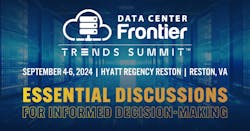Video: DCF Editors Matt Vincent, Rich Miller Preview 'Data Center Frontier Trends Summit' Live Event, Sept. 4-6
The following are transcript highlights from this video talk between Data Center Frontier's lead editors on the upcoming Data Center Frontier Trends Summit, the brand's inaugural live event being held Sept. 4-6 at the Hyatt Regency Reston in Reston, Virginia.
Matt Vincent, Editor in Chief, Data Center Frontier: We're here today to talk about the Data Center Frontier Trends Summit, which is, of course, our inaugural live event being held September 4-6 in Reston, Virginia. Rich, I said to you as we first started discussing the event that I hoped that it could be the embodiment of the brand. You know, you've read all the stories since 2015; you've followed the webinars and the videos and the podcasts. Now here we are to bring you the in-person representation of the brand. And as we put out the messaging and gathered the presentation proposals, I remember you telling me that you were just really impressed with the quality of the expertise that came in to offer to speak for this program.
Rich Miller, Founder and Editor at Large, Data Center Frontier: The whole idea of the Data Center Frontier Trends Summit is very much about the brand and what it's all about: We're really looking at the frontier. We're looking towards the horizon to see what's coming next in the data center industry and talk to people about what's in the pipeline. What they need to think about and know to be able to understand the trends that are evolving, and to position themselves and their organizations to succeed in a rapidly changing environment.
We have always liked to talk about the different streams of data and potential demand, and there have been so many different ones we've seen over the years all kind of feeding in. But right now, with what's happening with artificial intelligence, we are at an important moment to have an event like this and to talk about where the industry is headed, because a lot of things are changing, perhaps more so than at any time in the nearly 25 years I've been covering the industry.
We're seeing big change, and as always with data and digital transformation, it's sort of a secular transformation to not just the industry, but really the whole economy and all of society being impacted by some of the changes we see. All of that, as we know, comes back to infrastructure and the data center infrastructure to drive that. So it's an exciting time to be having this conversation.
The great thing is that over the years, we've built a really good community of people who we talk to and help us understand the things that are happening in cloud computing and AI. That's why we got a lot of good proposals. We've had a lot of good conversations about what we should be talking about, and what people really need to know to succeed. And I think the agenda as it has come together will be really relevant for folks in Northern Virginia and beyond. We're trying to figure out what comes next in a time of big, fast change.
MV: I'm really excited about one of the keynote panels for our event. Happening on September 5, the name of the panel is "The Future of AI Data Center Design: Power, Cooling, and Chip Considerations," trying to put together the whole picture for data center AI workloads.
RM: Designing for AI is a really important topic, because the workloads for artificial intelligence are somewhat different from many of the ones that we've seen driving the way that data centers are designed and built. They're much more dense in terms of their power usage, which has ripple effects throughout the data center infrastructure. Also you see what they call flux, which is where these workloads can come up and down in the levels of activity very quickly, so you could see the workload you need to support shift from moment to moment.
Some of the training workloads are very compute-intensive. Then on the other hand, you have the inference jobs that need to react quickly and are likely over time to be more and more distributed, even to devices. So the rise of AI has prompted some of the largest players in the industry to really think harder about a couple of things. One is the place of liquid cooling. The fact that some of these workloads are probably going to be best cooled by liquid, that that's the best way to get the best bang out of the square footage that you have available to run these workloads. And at the same time, many of the compute jobs that folks have are going to continue to be just fine with air cooling. We've written recently about the whole trend towards hybridization facilities, and Meta was out early talking about that, redesigning a bunch of their data centers in flight to essentially accommodate the world of design as it is evolving...
MV: It's certainly not lost on anyone that our event is happening in Northern Virginia, pretty much in Data Center Alley. The keynote panel of to kick off our event on Thursday, September 4 really reflects that. This panel is going to be led by Buddy Rizer, Economic Development Director for Loudoun County, a bona fide data center industry legend if there ever was one. He's going to be accompanied by Scott Noteboom, CTO of Quantum Loophole, which is a company that is so crucial down in that DMV-Delaware, Maryland, Virginia area, joined by Dan Golding, CTO of Applebee Strategy Group, and Stan Blackwell from Dominion Energy.
RM: As with the previous panel, this panel includes folks with very serious experience in understanding data centers and their role in the community, and what some of the avenues are that the industry ought to be thinking about as we try to navigate what is a very challenging environment to deploy large amounts of new data center space. As data centers get larger and require more resources, a lot of communities have hard questions, and we seek not a small amount of resistance to these projects in a lot of communities.
I've been writing about this topic for literally ten years. In 2014 was the first time I wrote about community resistance and community engagement in data centers. It's a very important topic, and I'm really jazzed that we have a panel like this to discuss it. Buddy Rizer is really the pioneer in economic development strategies to support data center growth and has been on the very front lines of the largest data center cluster in the world, where a lot of the most active conversation is going on regulations, a topic Loudoun County, where our event is going to be held, is talking about. Talking about whether or not there's more restrictions that need to be put on data centers, including around power, and whether they should have to bring their own power if it would strain the community resources.
Dan Golding and Scott Noteboom are a couple of guys with tremendous experience building some of the largest data center networks in the world. Scott started out at Yahoo. People know Dan Golding from his many years at Google, and those are guys who really understand what it's like to build at scale and at the same time understand the sensitivities to the community. And finally, Stan Blackwell - I think everybody's very interested in hearing from Dominion about what's going on. Stan has been working with the data center industry in Northern Virginia and beyond for a long time. So I think that is the kind of panel that can provide some real insight, and I'm really keen to see what kind of questions and discussion come out of that.
MV: Talking about this, the ability for people within the industry and attendees of the event to have networking opportunities, brings me to other features of the event. Of course, the DCF Trends Summit is also going to involve a tour of Sabey Data Centers in Ashburn, which is something that people are going to want to check out. I believe Michael Whitlock at Sabey is going to be the tour guide. I've toured that data center. Any data center tour will knock your socks off, but the quality of the insights people are going to receive from the people at Sabey on this tour is great.
Other sessions that we're going to be having at the event are for our Structured Roundtables, really pulling in the bulk of the very valuable speaking proposals that we received. I just wanted to go over the topics of the Structured Roundtables. We're going to have one on sustainable backup power. We're going to have a roundtable on water resilience presented by some experts from Geosyntec Consultants, and then roundtables on edge data centers, data center construction and hybrid IT and AI. In particular, Rich, I wanted to ask you about the water resiliency topic.
RM: One of the things that we've been trying to highlight at Data Center Frontier over the years is the areas where the industry has to be thoughtful and responsible about its use of resources. Water has become a big one. This is one where we always think about power as the metric that everybody wants to measure and track, and it's a big ticket item in the data center, so it goes right to the bottom line.
But water has become an increasingly important resource for communities around the country. Water scarcity is very real in some places. It's not an accident that the place this conversation has really started getting headlines was in the Phoenix area, a huge, huge data center market where there is lots of capacity planned going forward. At the same time, because of some of the water management issues in the Colorado Basin, that's an area where people have to think about and plan for water scarcity issues.
I'm really glad that we're going to have a focused discussion of that. I think it's really important and that everybody who's building a data center in an area that has water availability concerns of any kind really needs to have to think about how you're approaching cooling and operations, and be able to really balance what the impact on the community is going to be.
MV: I'm really excited, too, about the data center center construction roundtable. Miranda Gardner, with iMasons Climate Accord Executive Director, is going to be joining us to co-moderate that roundtable. So that'll be a conversation about green concrete and every other sustainability initiative that you can think of for data center construction...
Register now to attend the DCF Trends Summit.
About the Author
Matt Vincent
A B2B technology journalist and editor with more than two decades of experience, Matt Vincent is Editor in Chief of Data Center Frontier.



